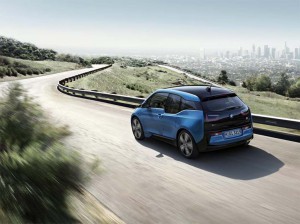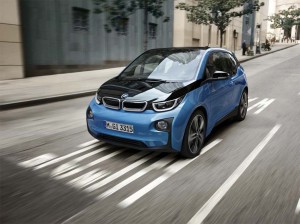It might seem like a lavish perk for a city worker to be driving a BMW, but the 100 German cars the City of Los Angeles will soon take delivery of aren’t ordinary BMWs.
They’re the little i3 battery-electric vehicles the Bavarian maker is producing in a bid to become a leader in the emerging market for sustainable automobiles. Los Angeles, in turn, has been pushing to become a more environmentally friendly city, even considering ways to add battery-powered police cars and motorcycles to its fleet.
“In the next three to four years, we will learn from the technology and use the opportunity to work with car manufacturers and design a robust high-performance patrol electric vehicle,” Vartan Yegiyan, director of the city’s police transportation office, said at a news conference. “That’s our aim.”
The initial 100 BMWs will be operated by LA police staff and detectives, and they are expected to each clock as many as 10,000 miles a year.
The Los Angeles Police Department will spend $387 a month for each of the vehicles as part of a three-year lease. That figure includes maintenance. But the city expects to significantly reduce overall operating costs since it will not need to fill the vehicles up with gasoline. California typically has some of the highest prices for gas in the country.
(BMW gets Scoop of ride-sharing app. Click Hereto get details.)

The i3 gets a bigger lithium battery and a range of 114 miles, which will help LA staffers as they traverse the city in the 100 cars they've leased.
On a per mile basis, analysts estimate the city could reduce its energy costs to operate the electric vehicles.
“BMW did … their homework and they wanted to sell the cars,” Yegiyan said, noting other manufacturers competed for the contract.
Long known for its smog problems, Los Angeles has been pushing sustainable solutions, and both civilian and police departments have already begun looking at cleaner transportation solutions, including adding a small number of battery-powered motorcycles.
Those bikes have the performance a police officer on patrol needs, but a department official involved in vehicle testing cautioned that range was the problem that prevented wider use of the clean motorcycles.
(BMW updates i3, boosts range. Click Here to check it out.)
Range is a similar problem with electric cars, though BMW plans to boost the distance its little i3 can get between charges from 85 to 115 miles for the 2017 model-year.
The automaker announced it is also developing an Internet application that will provide near real-time tracking to monitor the use of the new battery-cars.
During the next few years, a number of manufacturers hope to tackle the issue of range anxiety while also reducing further the price of their electric vehicles. California-based Tesla, for example, plans to bring to market the 200-mile Model 3 late next year for around $35,000. General Motors will launch the 200-mile Chevrolet Bolt towards the end of 2016, meanwhile, for around $30,000 after factoring in a federal tax credit.
The Chevy electric model was designed, at least in part, with fleet applications in mind. GM is expected to offer a deal to drivers for the ride-sharing service Lyft to lease the Bolt.
(To see more about the 2017 BMW 2-Series twin-power engines, Click Here.)
A number of other cities around the world have started using electric vehicles, including Barcelona, Spain. Elsewhere in California, meanwhile, the city of Santa Clara is electrifying another part of its fleet, launching several battery-powered garbage trucks later this summer.


It must be fun when you’re spending other people’s money.
Can they wait for a few months more for an all American made Chevy Bolt? BMW I3 is one of the worst E car on the market, in terms of performance and PRICE… Irresponsible public official spending public money…
If anyone drove a BMW in the 80s, one will never buy a BMW again, I own 5 BMW which include 320 to 323i and one 528. BMW and Auto Union famous for pushing their “not so reliable” product to the market and let the owner suffer.
Anyone bought a Ro80 in the 80s would know that.